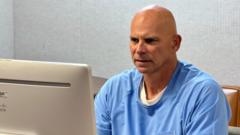The decision underscores the ongoing debate surrounding the Menendez brothers' notorious case, now under renewed scrutiny following recent legal developments.
**Menendez Brothers Parole Bid Denied as Erik Faces Setback in Freedom Attempt**

**Menendez Brothers Parole Bid Denied as Erik Faces Setback in Freedom Attempt**
Erik Menendez's first plea for parole was turned down, reflecting concerns about public safety and his prison conduct.
Erik Menendez's quest for parole faced a significant hurdle as California officials denied his request during a hearing held virtually from San Diego prison. The younger Menendez brother, who, along with his brother Lyle, was convicted for the 1989 murders of their wealthy parents, Jose and Kitty, in Beverly Hills, made his appeal before a board after being resentenced in May.
Erik's next opportunity for parole will come in three years, as the board concluded he poses an "unreasonable risk to public safety." Board commissioner Robert Barton expressed a belief in redemption but stated Erik's behavior in prison raised concerns. "You have not been a model prisoner, and frankly, we find that a little disturbing," Barton commented, providing Erik with a critical choice: either wallow in self-pity or take necessary steps for personal growth.
This denial may turn attention toward California Governor Gavin Newsom, who is also considering clemency requests from both brothers. If granted, such clemency could lead to reduced sentences or even pardons, although it would not modify their convictions. The political implications of such a decision could be significant, particularly as Governor Newsom eyes a potential presidential run.
The brothers have also sought new trials based on the emergence of additional evidence, a motion currently being considered by a judge, although met with opposition from the Los Angeles district attorney’s office. During Erik's hearing, prosecutors labeled his behavior as self-serving, asserting that his displayed changes were only an effort to secure release.
Erik, appearing in a blue prison jumpsuit, emotionally recounted the day he and Lyle killed their parents. He expressed profound sorrow for the pain inflicted on his family and emphasized the tragedy of their dysfunctional relationships. "I want the healing to be about them... it's the healing of the family," Erik stated before learning of the board’s decision.
The hearing scrutinized Erik's past, including previous criminal activities and prison behavior. Testimonies from family members who supported Erik highlighted his reported transformation, with his aunt poignantly sharing her wish to reconcile before her terminal illness.
Despite the board's caution, discussions around the Menendez brothers' fate reignite amidst evolving perceptions of their actions, influenced by historic abuse claims and a cultural reevaluation of their case. As both brothers continue their fight for freedom, the public’s and legal system’s gaze remains fixed on the complexities of their intertwined narratives, with significant implications for their futures.
Erik's next opportunity for parole will come in three years, as the board concluded he poses an "unreasonable risk to public safety." Board commissioner Robert Barton expressed a belief in redemption but stated Erik's behavior in prison raised concerns. "You have not been a model prisoner, and frankly, we find that a little disturbing," Barton commented, providing Erik with a critical choice: either wallow in self-pity or take necessary steps for personal growth.
This denial may turn attention toward California Governor Gavin Newsom, who is also considering clemency requests from both brothers. If granted, such clemency could lead to reduced sentences or even pardons, although it would not modify their convictions. The political implications of such a decision could be significant, particularly as Governor Newsom eyes a potential presidential run.
The brothers have also sought new trials based on the emergence of additional evidence, a motion currently being considered by a judge, although met with opposition from the Los Angeles district attorney’s office. During Erik's hearing, prosecutors labeled his behavior as self-serving, asserting that his displayed changes were only an effort to secure release.
Erik, appearing in a blue prison jumpsuit, emotionally recounted the day he and Lyle killed their parents. He expressed profound sorrow for the pain inflicted on his family and emphasized the tragedy of their dysfunctional relationships. "I want the healing to be about them... it's the healing of the family," Erik stated before learning of the board’s decision.
The hearing scrutinized Erik's past, including previous criminal activities and prison behavior. Testimonies from family members who supported Erik highlighted his reported transformation, with his aunt poignantly sharing her wish to reconcile before her terminal illness.
Despite the board's caution, discussions around the Menendez brothers' fate reignite amidst evolving perceptions of their actions, influenced by historic abuse claims and a cultural reevaluation of their case. As both brothers continue their fight for freedom, the public’s and legal system’s gaze remains fixed on the complexities of their intertwined narratives, with significant implications for their futures.




















